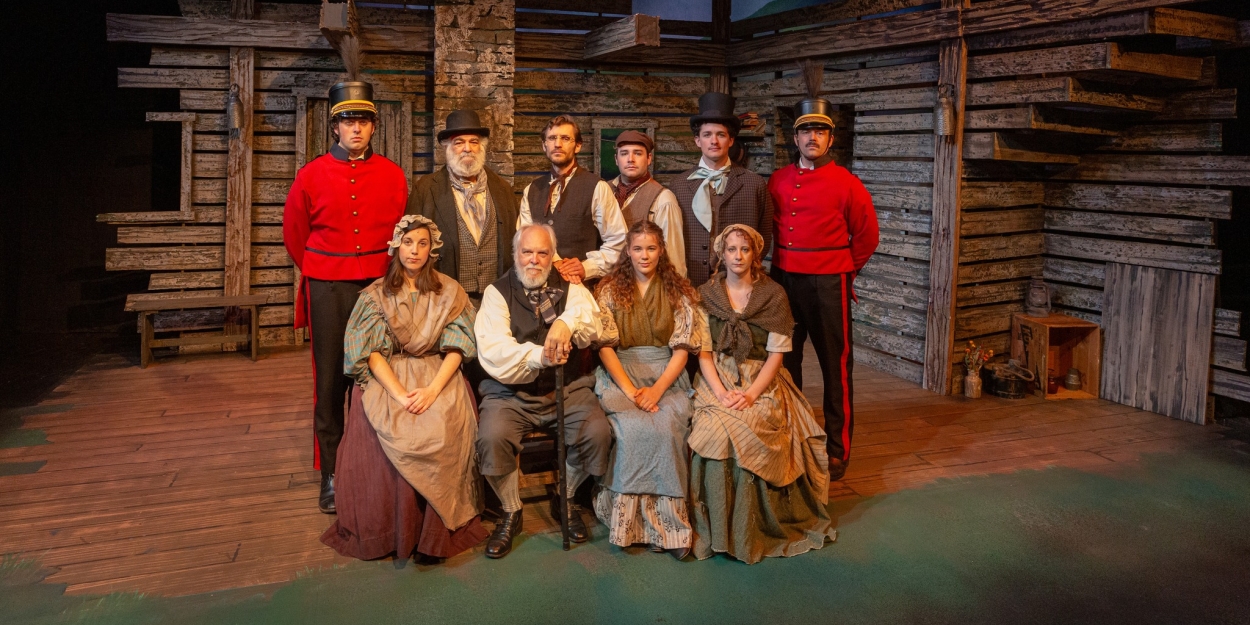Review: Final Weekend of TRANSLATIONS, Brian Friel's Masterpiece, at Vermont Stage
Don’t miss this unique opportunity to see Irish playwright Brian Friels’ engrossing drama, Translations, at Main Street Landing.

Brian Friel’s Translations reveals masterful breadth and depth with intertwining themes of cultural identity and language, place and belonging, encircling a pair of unlikely lovers and their new-found love.
The backdrop is County Donegal, Ireland in 1833. Set in a makeshift classroom in an old barn, where Hugh (Timothy Barden) teaches Latin, Greek and maths, but not English, to neighbors eager to learn. When Hugh’s prodigal son, Owen (Henry Sheeran) returns after many years, he’s in the employ of the British military and working with Lieutenant Yolland (Zack Stark) to translate the names of places of the area for an army map. The old place names are erased and replaced with words that work more easily into the British vernacular.
Manus (Quinn Post Rol), Hugh’s son and a quiet Nationalist, assists his father with teaching, and cares for him when his father is incapacitated by drinking. Manus patiently assists a young girl, Sarah (Stefanie Seng) who is assumed to be mute, to speak, and to say her own name. Maire (Caitlyn Walsh) is a headstrong milkmaid that is Manus’ love interest. She studies with Hugh, and wants him to teach her English.
Owen introduces British Captain Lancey (Kyle Ferguson) and Yolland to the students and the officers enjoy the good-hearted hospitality of the group when they first arrive at the school. Hugh’s students, the perceptive Bridget (Aleah Papes), rebellious Doalty (Ry Poulin) and the remarkable “infant prodigy” Jimmy Jack Cassie (Mark Stephen Roberts). Manus and Hugh understand English, and recognize that Owen is involved in a military operation with the soldiers. The students do not speak English, and hear only Owen’s unreliable translations when the soldiers are speaking. Although the Irish characters speak their lines in English, the audience can fairly easily understand, due to the dialect and rhythms of speech, that the Irish characters are speaking in their native language.
When Maire hears that Manus cannot piece together a living to support a family, she announces her intention to go to America. Her dream to get away from the impoverishment of her home fuels her interest in learning the English language. Maire finds she likes to hear Lieutenant Yolland talking, even without having comprehension of what he’s saying. In turn, Yolland is appreciative of the ancient Irish heritage and language, and of Maire’s spirit and beauty.
As Owen and Yolland rename the area for the army map, Friel’s play reveals how these places came to be named in the first place. Stories of the people who lived there and what happened to them at each location determined the name, branding history into the place names and allowing for a “remembering” that shapes cultural identity. Yolland struggles with this task, and senses that something is being eroded as they “standardize” the place names.
Lieutenant Yolland tells Hugh, the schoolmaster, about his infatuation with County Donegal and its inhabitants, some of whom converse in Greek and Latin. In his work renaming the towns, Yolland found an area named for Terminus, the god of boundaries, which strikes him as brilliant.
Hugh responds “we like to think we endure around truths immemorially posited.” He agrees that Gaelic is “A rich language. A rich literature. You’ll find, sir, that certain cultures expend on their vocabularies and syntax acquisitive energies and ostentations entirely lacking in their material lives. I suppose you could call us a spiritual people.”
Owen protests Hugh romantic view of life in Donegal. But Hugh continues “Yes, it’s a rich language, Lieutenant, full of the mythologies of fantasy and hope and self-deception – a syntax opulent with tomorrows. It is our response to mud cabins and a diet of potatoes: our only method of replying to … inevitabilities.”
Yolland is falling in love with the Irish landscape, culture, and Maire, and he dreams of living there, at the same time feeling guilty for his role in the denigration of culture by making a map for the British with new names. Hugh admonishes him and says “But to remember that words are only signals, counters. They are not immortal. And it can happen – to use an image you’ll understand – it can happen that a civilization can be imprisoned in a linguistic contour which no longer matches the landscape of fact.”
Soon, Maire and Yolland find a private moment together outside a dance in the village. Dan Gallagher’s beautiful lighting design for this love scene under a night sky successfully sets a mood of intimacy, and left space for the audience to fill in the missing pieces of what the lovers’ misunderstandings might mean for their future.
Director Cristina Alicea expertly achieves the mood of the period with combined effects of staging and costumes (Suzanne Kneller) and establishing place with lyrical dialect contrasting with crisp British accents (Dialect coaching – Jordan Gullikson). This solid ensemble of actors is lyrical and joyful in the telling of Friel’s story, almost dancing through the action in the scenes, even as the story they are telling is poignant and ultimately, a dissolution of the fabric of the life the characters are living.
The classroom (Design - Jeff Moderger, Tech - Chuck Padula) beautifully conveys the rural and earthy nature of the inhabitant’s lives with stools, slates, makeshift desks, slates and milk buckets (Props master – Sue Wade) and the play is sturdily managed by John Hughes. Sound designer Martha Goode enhances the mood, especially with sounds of soulful rainfall in the third act.
This is a great opportunity to see a masterpiece by Brian Fried and to enjoy the unified ensemble work and effective production, this play is fine achievement for Vermont Stage.
Reader Reviews
Videos

